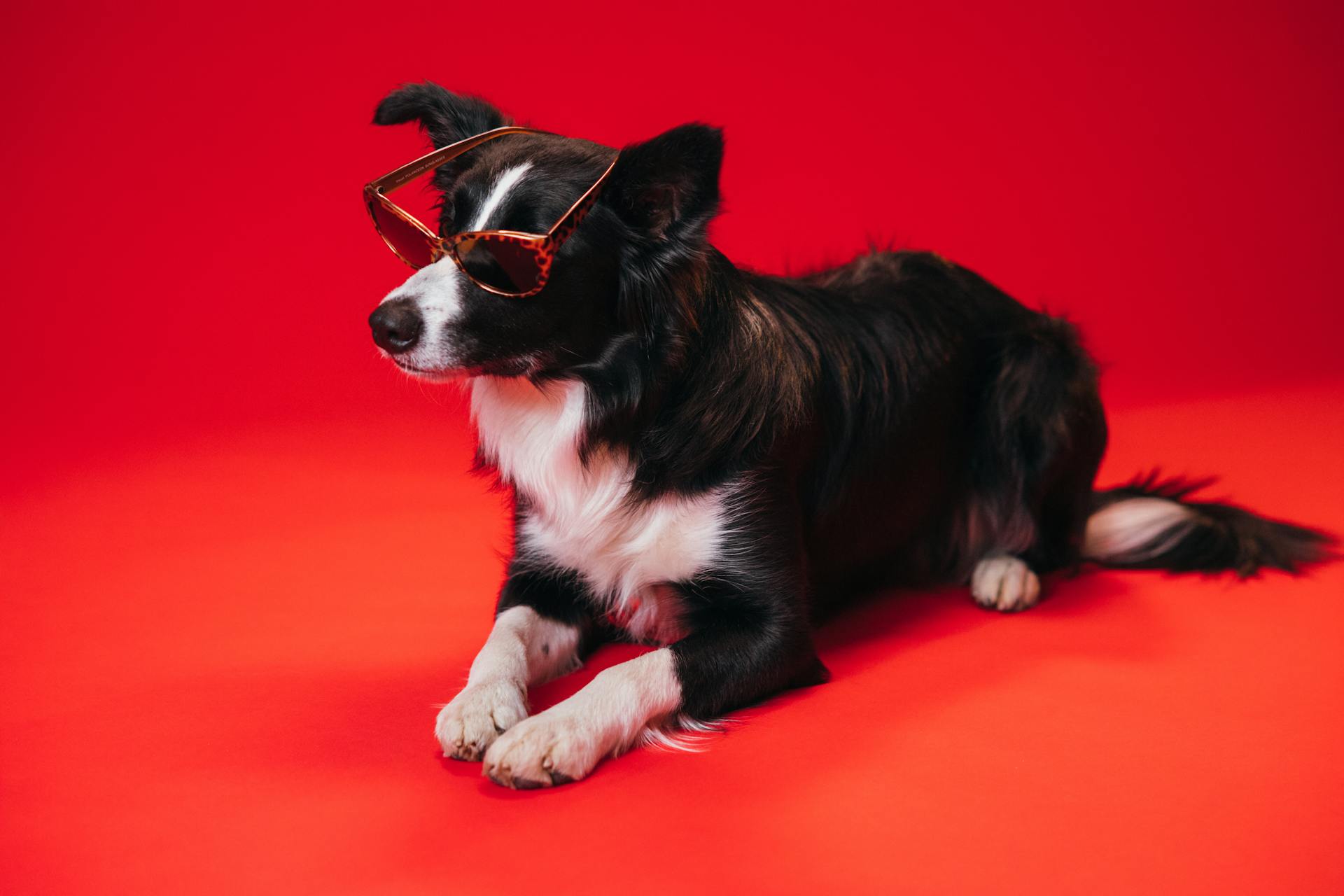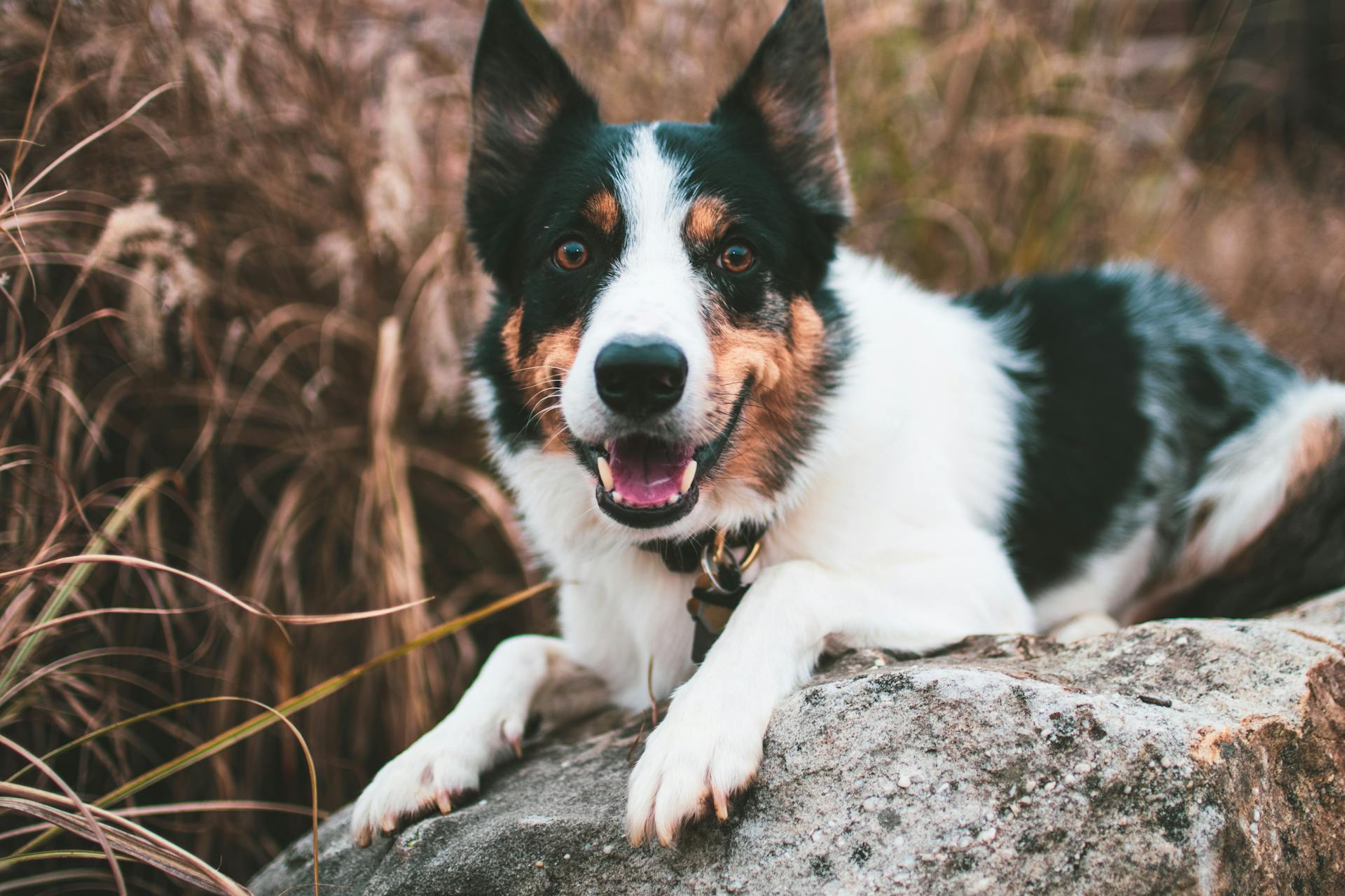
The Border Terrier's origin story is a fascinating tale of how this lovable breed came to be. They originated in the Anglo-Scottish border region, as their name suggests.
The Border Terrier's early history is closely tied to the region's rich history of sheep herding and hunting. This is reflected in their strong work ethic and ability to thrive in rugged terrain.
One of the key factors in the Border Terrier's development was their need to be small and agile enough to follow hounds on horseback. This requirement led to the breed's compact size and energetic nature.
Their strong prey drive and ability to track small game made them a valuable asset to local hunters and farmers.
You might enjoy: Tiny Yorkshire Terrier Puppy
Physical Characteristics
The Border Terrier's physical characteristics make them a unique and special breed. They have a broad skull and moderately short muzzle, with strong teeth and a scissor bite.
Their head shape is often described as otter-shaped, which is a distinctive feature of the breed. Their V-shaped ears fall towards the cheeks, and they have a short, coarse coat that comes in a variety of colors, including red, blue, tan, wheaten, and grizzle and tan.
Suggestion: Short Haired Border Collie Terrier Mix
Border Terriers have small, keen eyes with a bit of a mischievous expression, and black noses. They have a double coat, consisting of a soft undercoat and a coarse, dirt-resistant outer coat.
Here are the typical height and weight ranges for Border Terriers:
Their tail is moderately short and thick at the base, and they have small and compact feet with thick pads. Their hind legs are muscular, and they have a sturdy build overall.
Breed Group and History
The Border Terrier is a member of the Terrier breed group, which originated from the Latin word Terra, meaning earth. This group of dogs was bred to be brave and tough, and to pursue vermin above and below ground.
The breed was developed by farmers and shepherds from the Scottish-English border region to help reduce the fox population. They needed a dog that was athletic, brave, intelligent, and driven to catch and deter foxes that were a threat to their sheep.
The Border Terrier's ancestors can be traced back to the Dandie Dinmont and Bedlington terriers, which are also from the same area. The breed was originally referred to as the Coquetdale Terrier or Redesdale Terrier, but by the late 1800s it was generally known as the Border Terrier.
Additional reading: Terrier Dog Group
The Breed Group
The Terrier breed group originated from dogs bred and used for hunting vermin, specifically fox, badger, rat, and otter. They were selectively bred to be extremely brave and tough.
The term 'Terrier' comes from the Latin word Terra, meaning earth. This breed group has been around since ancient times.
Terriers have been portrayed by writers and painters as early as the Middle Ages, showcasing their game breed characteristics. They were developed to pursue game above and below ground.
The Border Terrier, a specific breed within the Terrier group, was originally referred to as the Coquetdale Terrier or Redesdale Terrier. It was developed by farmers and shepherds from the border of England and Scotland to help reduce the fox population.
Curious to learn more? Check out: Game Bred American Pit Bull Terrier
History of the
The Border Terrier breed has a rich history that dates back to the Scottish-English border region. Originally referred to as the Coquetdale Terrier or Redesdale Terrier, the breed was developed by farmers and shepherds to help reduce the fox population, capable predators who were hunting the farm animals.
In the 19th century, foxhunting became a sport, and the Border Terrier was used to run alongside horses and the hounds, showcasing its determination, intelligence, and hardworking nature. The breed's legs had to be long enough to keep up with the chase but short enough to be able to crawl inside the fox's den.
The breed's name was officially changed to Border Terrier in the late 1800s, due to its association with the Border Hunt in Northumberland. This change marked the beginning of the breed's popularity, which continued to grow when it was recognized by the English Kennel Club as a distinct breed.
The Border Terrier's ancestors can be traced back to the same area as the Dandie Dinmont and Bedlington terriers, which were also developed for hunting purposes. The breed's athletic, brave, and intelligent nature made it an ideal companion for farmers and hunters.
The Kennel Club of the U.K. first recognized the breed in 1920, and the American Kennel Club recognized it in 1930, further solidifying its place in the dog world. Today, the Border Terrier is a moderately popular dog breed in the United States and still quite popular in the U.K.
The original purpose of the Border Terrier was to bolt foxes that had gone to ground, and it was also used to kill rodents, hunt otters, and badgers. The breed's first standard was written by Jacob Robson and John Dodd in 1920, and the first Kennel Club Border Terrier ever registered was The Moss Trooper, sired by Jacob Robson's Chip in 1912.
A fresh viewpoint: American Kennel Club Lancashire Heeler
Terrier Breed Characteristics
The Border Terrier breed is a unique and fascinating one, and their physical characteristics are a big part of what makes them so special. They have a broad skull and moderately short muzzle, with strong teeth.
Their ears are V-shaped and fall towards their cheeks, which gives them a distinctive look. Common coat colours include grizzle-and-tan, blue-and-tan, red, or wheaten.
Border Terriers have a double coat that consists of a short, dense undercoat and a harsh, wiry outer coat that's resistant to weather and dirt. This coat helps them navigate the rough terrain they're bred to work in.
Here are the average heights and weights for males and females:
Characteristics
The Border Terrier is a breed that's known for its loving temperament, especially with its family. They're highly affectionate and loving, making them a great companion for many.
In terms of their exercise needs, Border Terriers require moderate activity to stay happy and healthy. They love to play, so daily playtime and regular walks are a must.
One of the unique characteristics of the Border Terrier is their ability to adapt to family life in both the town and country. They're a working terrier at heart, but they've also earned a reputation for being great with children when properly trained and socialized.
Their intelligence is another notable trait, with Border Terriers being considered highly intelligent dogs. This makes them moderately trainable, but they can also have a strong-willed streak to their personality.
Here's a breakdown of some of the key characteristics of the Border Terrier:
In terms of their physical characteristics, Border Terriers are known for their broad skull, moderately short muzzle, and strong teeth. Their V-shaped ears fall towards their cheeks, and they have a double coat consisting of a short, dense undercoat and a harsh, wiry outer coat.
Additional reading: Ruby Short Hair Cavalier King Charles Spaniel
Terrier
The Terrier breed group originated from dogs bred and used for hunting vermin, and the name "Terrier" comes from the Latin word Terra, meaning earth.
These hardy dogs were selectively bred to be extremely brave and tough, and to pursue fox, badger, rat, and otter above and below ground.
Terriers have been known since ancient times, and were even portrayed by writers and painters as early as the Middle Ages.
The Border Terrier, a specific type of Terrier, originated in the borderlands that separate England and Scotland in the early 18th century.
They were used by farmers for ratting in the barn and hunting hill fox, and proved to be skilled at hunting otter, rabbit, and badger.
Their ability to chase foxes down into underground dens made them invaluable to hunters, who could even identify their location by listening for their barking.
The Border Terrier was officially recognized by the American Kennel Club in 1930, and has since become a popular family pet.
Sources
- https://wagwalking.com/breed/border-terrier
- https://www.thekennelclub.org.uk/search/breeds-a-to-z/breeds/terrier/border-terrier/
- https://www.thesprucepets.com/border-terrier-dog-breed-profile-4780473
- https://en.wikipedia.org/wiki/Border_Terrier
- https://www.wisdompanel.com/en-us/dog-breeds/border-terrier
Featured Images: pexels.com


